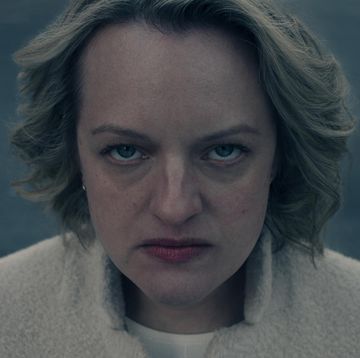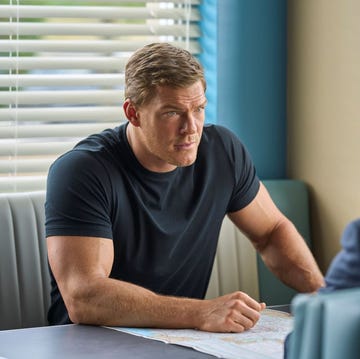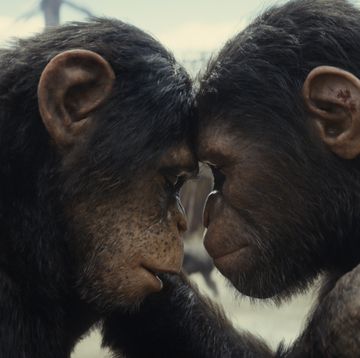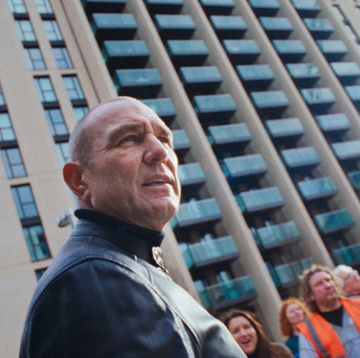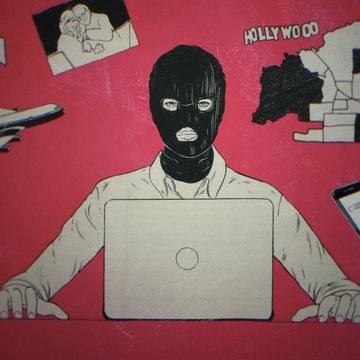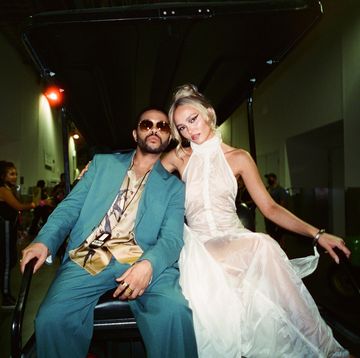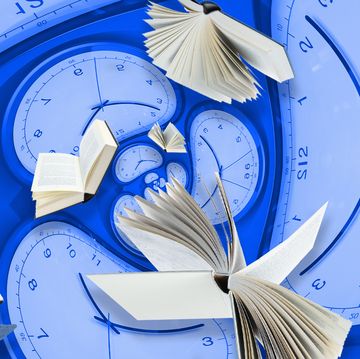Sometimes, it's the shit you don't want to hear that wakes you up. At least, that's been the case for the American rockers the Kings of Leon in recent years. In 2022, while headlining dates in Australia and New Zealand, the foursome, made up of lead singer Caleb Followill and his older and younger brothers Nathan and Jared as well as their cousin, Matthew, was approached by their management team about the then-upcoming 20-year anniversary of Youth & Young Manhood, their debut album. Was it time for a greatest hits album or a nostalgia tour? The band bristled. “I wasn't ready for that yet,” says Followill, 42.
It wasn't that he felt too young or that an anniversary re-release felt too lame. It was that looking back would tear the singer's attention away from what was happening inside of him at that very moment. From the dramatic personal transformation that was just on the horizon. Freshly into his forties and grappling with the sudden, unexpected loss of his mother the year prior, the singer was in the middle of a period of intense soul-searching that would, soon after, change the way he approached every facet of his life—from his music and band to his marriage and his children.
Followill was already writing at that time and, after splitting with their longtime label, in January 2023, the Kings of Leon decided to make a record just for themselves. They holed up in a studio outside of Nashville and, with producer Kid Harpoon (Harry Styles) in tow, let it fucking rip. They got loud and a little weird. Toyed with punk, and returned to the lo-fi, frenetic sounds that rattled their early LPs. Through it all, Followill didn't blink: “I had this unshakeable determination,” he recalls. The result is Can We Please Have Fun (out May 10), a raucous and, at times, explorative 12-song set that answers the question its title begs handedly.
Kings of Leon have scaled the mountain more than once during their 21 years and, with this collection, nine albums. They've been the biggest band in the world with a hit song (“Sex on Fire”) that they couldn't escape. Won four Grammys, including an all-genre Record of the Year trophy for “Use Somebody” off 2008's behemoth Only By the Night LP. Partied harder and fought louder than damn near anyone else. But when Followill heard the finished Can We Please Have Fun for the first time, he fell to his knees. For the first time in a long time, he felt like their true greatness was still ahead.
Below, Esquire goes long with Followill on creativity and personal redemption, and the reprieve that comes from a good, long cry. This conversation has been edited for clarity and length.
ESQUIRE: It’s a few days before album release. How do you handle this period of anticipation?
CALEB FOLLOWILL: It sounds corny, but I really love this record and loved making it, and I’m sad that that portion of it is over with. So, to be able to relive it in interviews, it’s actually exciting.
Have you ever felt this sort of sadness before when you finished an album?
This is the most. I was sad when the actual recording was finished. We were just clicking—and up until the end it was just like, “All right, what do we need?” And if somebody said, “What about a rock song?” Or, “a ballad,” I was so inspired that I was like, “Any challenge, I’m ready for it.” That’s never happened before in our career.
In the beginning you’re pretty creative but it’s to prove yourself, especially in this town. We live in Music City, so it’s a constant struggle to get people to respect you—unless you have a cowboy hat or your first name is Reba, and I have considered changing my name.
Do you write every single day?
I write every day, but not songs. I’ll start my morning writing. I usually write a couple of pages, just to clear my head. I read a book that inspired me. First thing in the morning, you write and work through your shit.
What’s the book?
It’s a book called The Artist Way. My sister-in-law got it for my wife, and then my wife read it and loved it and gave it to me, and it sat in my office for a while. One day, I picked it up and it was just different; you read a chapter and you apply it to your life. But the one thing that really stuck with me was the morning pages.
For a long time, I would wake up and it was just stress, stress, stress. And it would take me a while to get through that. But with this, as soon as I write a couple of pages in the morning—it’s not like the stresses of the world go away, but you feel like you’re capable of tackling them.
Was the morning stress a result of having young kids and getting through the chaos of up and dressed and out the door or was it waking up and being flooded with news alerts about what’s going wrong in the world?
Well, there’s probably that, but the one thing that it has done is it’s pushed me further away from looking at my phone and my computer. If a bomb dropped somewhere, it would take a minute for me to know that it happened. I just don’t have the energy to play the fear mongering game. But it’s opened me up in a lot of ways. I recommend it to everyone that I meet. Right before we started the record, I bought a copy for every guy in the band. I was giving them out like I wrote them.
Did everyone read it?
I think, for a minute, people were reading them. And then whenever it started to come apart, I was like, “Oh, I don’t think they’re still doing this” [laughs].
It sounds like you were in a profoundly open headspace for this record. Was that prompted by the music inside of you, or were you on a personal journey that then resulted in this music?
It was a personal journey that made me fall in love with music again. We lost our mom [in 2021], which was a big shock. And I’m in a band with my two brothers, so they also lost their mother, and we all went our separate ways and dealt with it.
For me, I’ve tried to be the tough cowboy guy that doesn’t cry and all that shit—I feel like I’ve changed a little bit, because I’ve matured and now, I cry a lot [laughs]. But I wanted to do something in her honour. I wanted to make something that I felt like she would be proud of. She always thought that we hung the moon, as most parents do, but she really fucking believed it. She always made us believe that we were as good, if not better, than everyone else because we were special. We had something, and the world was going to see it. We didn’t ever really know what that was but anything that was in front of us, we chased it as fast as we could.
Her death was sudden.
Unexpected loss is something that you’re not prepared for. So, when it does happen, some people may turn to drinking, some people may turn to religion. Some people may turn off completely. I probably did all of those things. Then, eventually, it was like, “All right, I have to do something productive.” Music was that for me. And it’s not about writing songs about loss or family. It’s about taking steps closer to greatness.
You talk about this tough guy character you felt like you had to play in life, and it makes me think about all the tough guy characters who fill the lyric sheets on all the previous Kings of Leon records. This album is very much not that. It seems like that was shed from your life as well as your writing.
A lot of this stuff was just happening in me. I was just in the room and kind of looking around going, “Whoa.”
You spoke very candidly on the Oklahoma Breakdown podcast about how there were periods of your career where you were going through the motions. Were you aware of that during those phases or is it only now, having had this experience where you were so turned on, that you see that clearly?
It was never like I was purposely only giving 75%. But…I mean, I’m sure I knew that I wasn’t living up to my full potential. But I was probably too scared to live up to my full potential. Scared of what people would think—even my own band. I was always the anti-frontman. I wanted to be a guy that was in the picture, but not in the foreground. It was time for me to step up. I felt like, not only was I the quarterback, but I wanted the fucking ball.
This is a radical mind set shift. How has this extended into your life as a dad and a husband?
In every aspect of my life, I’ve taken the same mentality. And once people have seen you at your best, then you go, “Fuck, now I can’t go back.” Now my kids have seen me be a great dad. My wife has seen me be a great husband. My brothers have seen me be a great brother. My dad has seen me be a great son.
Right. You have to keep it going.
In the back of your mind, you’re like, “I’ll do this for a couple years, and then I’m gonna just burn this thing to the ground. I’m gonna go to a beach and drink myself dead.” But the reality is, once you’ve felt it, it’s a great feeling.
Looking back to the times that I wasn’t giving it my all, all that emptiness that I thought was because of one thing or another, it was really just because I wasn’t living up to my full potential. And I still have a lot to do. I can write better songs and be a better dad and be a better friend. I’ve felt what it feels like to be truly inspired, and to turn my back on that would be a disservice.
Tell me about when you heard the finished album for the first time.
I have this walk that I take at my house; I have a nice little morning walk that I take. And a lot of the times, while we were making the record, I’d be out there thinking about the album. After the album was finished, I took that walk one morning and listened and, it’s not the manliest thing to admit, but the first time I heard it on the walk—on the exact trail that I walked when all of it was coming together—it was as emotional as I’ve ever felt with our music. It felt like the universe was giving me a pat on the back.
When you think about a watershed emotional moment like that, or any of this shedding of this tough guy persona, and how good it feels—is this something you wrestle with as a father? How to instil a healthy softness in your kids?
You know, that’s the way we were raised. And I do have to remind myself that it’s a different time. I had some tough grandparents, and everything was “rub some dirt in it,” “get up and stop crying.” Without that, I feel like we wouldn’t be here. It made me, every time we were in Nashville and trying to become songwriters or find our voice and the door was slammed in our face, it was, “That’s find. Let’s go to the next one.” But yeah, I try not to instil that in my children, that you have to be tough … but I do want them to be a little tough [laughs].
You’ve got tour dates suddenly stretching far into the future. How are you preparing for that?
You touched on it earlier, but this creative change going on with us has spilled over into what the live show is going to look like. You know, people spend their hard-earned money to go to concerts, and even doing that is a pain in the ass! I don’t care who’s coming to down. It could be the greatest band in the world and there will be a moment when I’m sitting there going, “Should we just watch a movie?” So knowing that, when people come to our show, I want to give them the best night of their life. I want them to leave going, “Can you imagine if we stayed home?”
Madison Vain is the Digital Director at Esquire; a writer and editor living in New York, she previously worked at Entertainment Weekly and Sports Illustrated.








